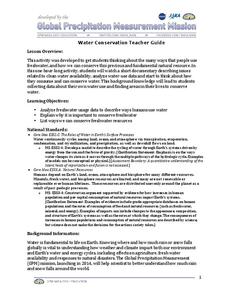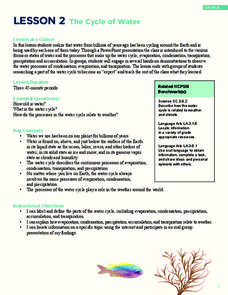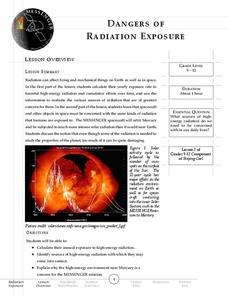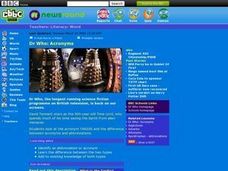Space Awareness
History of the Universe
Your pupils may believe that you and their parents are the oldest things in the universe, but surprise! There are elements of the universe that are even older. Elementary scientists create a class timeline to demonstrate the expansive...
Curated OER
Tracing Our Own Family Pilgrimages
The Pilgrims may have arrived in North America by way of the Mayflower, but chances are, your class members' ancestors came to the United States in another way. Guide them through an exploration of their own heritage, countries of...
Curated OER
Water Conservation
Open learners' eyes to the challenge of finding safe drinking water – something we often take for granted in our country. The PowerPoint presentation includes images, graphs, diagrams, and even a video to stimulate discussion on how we...
Curated OER
Water in Earth's Hydrosphere
Environmentalists test stream water for temperature, pH, and turbidity. Each group shares their information and then the class makes an overall evaluation of the water quality. A slide show sets the backdrop for the teaching portion and...
NOAA
The Cycle of Water
Young water cycle enthusiasts discover the water they have been using has been cycling around the earth for billions of years. Through presentations, learners will understand that water has three states and how these forms fit into the...
Ventura County Air Pollution Control District
Effects of Global Warming
Your learners have probably heard of climate change, but do they really understand what it is? Study the history, details, and future implications of global warming and the greenhouse effect with a set of activities designed for an...
Messenger Education
Sensing the Invisible: The Herschel Experiment
The electromagnetic spectrum includes everything from very powerful gamma rays (which are used to treat cancer) to much weaker radio waves (which include microwaves). Through a hands-on activity, scholars explore the temperature...
Messenger Education
Dangers of Radiation Exposure
Gamma radiation, which is harmful, is useful in treating cancers. In the second lesson in a series of four, young scientists take surveys and calculate their yearly exposure to ionizing radiation. Then they read about how harmful their...
Chicago Botanic Garden
Carbon, Greenhouse Gases, and Climate
Climate models mathematically represent the interactions of the atmosphere, oceans, land, sun, surface, and ice. Part two in the series of four lessons looks at the role greenhouse gases play in keeping Earth warm and has participants...
Chicago Botanic Garden
Calculating Your Ecological Footprint
You can lower your ecological footprint by recycling! Lesson four in this series of five has individuals, through the use of a computer, calculate their ecological footprints. Through discussions and analysis they determine how many...
Curated OER
Soils and Particle Size
In this soil worksheet, students are given a "Textural Triangle" showing the percent of clay, sand and silt in soil as well as measurements of the particles found in soil.
Curated OER
Letter L
Young scholars will have fun learning about the letter "L" with the activities in this lesson plan. The author suggests reading "Lightning Bug" from the McGraw-Hill reading book. However, you may find other poems that are fitting for...
Curated OER
Understanding Biodiversity Via Ecological Footprints
Sixth graders investigate the ways in which human beings impact the environment and ecology through the calculation of their own ecological footprint, discussion questions pertaining to biodiversity and potential imbalance hazards, and...
Curated OER
Save the Planet!
Third graders explore the Recycle City Web site. They examine ways to save the environment. They write a short interview between a news reporter and an environmental expert. They practice acting out their news report.
Curated OER
Distance in Space
Sixth graders explore space science by measuring distances between planets. In this solar system lesson, 6th graders view a Bill Nye video and discover the conversion between the metric system and imperial measuring systems. Students...
Curated OER
What on Earth is Greater Than?
Students compare things that are greater than, less than, or equal to, compare the Earth to other planets, and list planets from greatest size to smallest size.
Curated OER
Solar System Adventure
Students study the solar system and our galaxy, then write a science fiction story based on what they discover. They utilize worksheets and access websites imbedded in this plan to gain ideas for their stories.
Curated OER
Recycling Pals Coloring Page
In this recycling coloring worksheet, students color the six recycling characters pictured. Students then follow the 6 sets of instructions that challenge them to draw recycling pictures of their own.
Curated OER
Dr Who: Acronyms
Students explore abbreviations and acronyms. Students examine the difference between the two types. Students complete a worksheet, sorting words. They write a creative script containing abbreviations and acronyms.
Curated OER
Sky Watching
Students examine telescopes and understand how they have helped us better understand the sky. In this astronomy lesson students complete a worksheet and a lab activity.
Curated OER
You Need How Much Food When? Where?
Ninth graders explore how human activities shape the earth's surface. In this awareness lesson, 9th graders create pictographs showing the relations of food, people, land, and resources. Students complete worksheet.
Curated OER
Windows to the Universe Scavenger Hunt
Students access the Internet to go on a scavenger hunt to investigate the solar system. In this space mission lessons students fill out a worksheet and explain how technology and scientific inquiry have helped us learn about the...
Curated OER
Prefixes
Read out loud the stories Doctors Try to Separate Joined Twin Sisters, and New Planets Discovered. Focus on these words and the meanings of their prefixes: conjoined, extra-solar, telescopes, and universe. Then read information on the...
Curated OER
Extreme Elevations
In this geography worksheet, 5th graders work in groups in order to locate and graph mountains found on all the continents of planet earth.
Other popular searches
- Worksheets Planets Diagrams
- Worksheets Planets 1 2 Grade
- Worksheets Planets K
- Nine Planets Worksheets
- Worksheets Planets 3 4 Grade
- Stars and Planets Worksheets
- Planets Worksheets
- The Planets Worksheets
- 8 Planets Worksheets

























